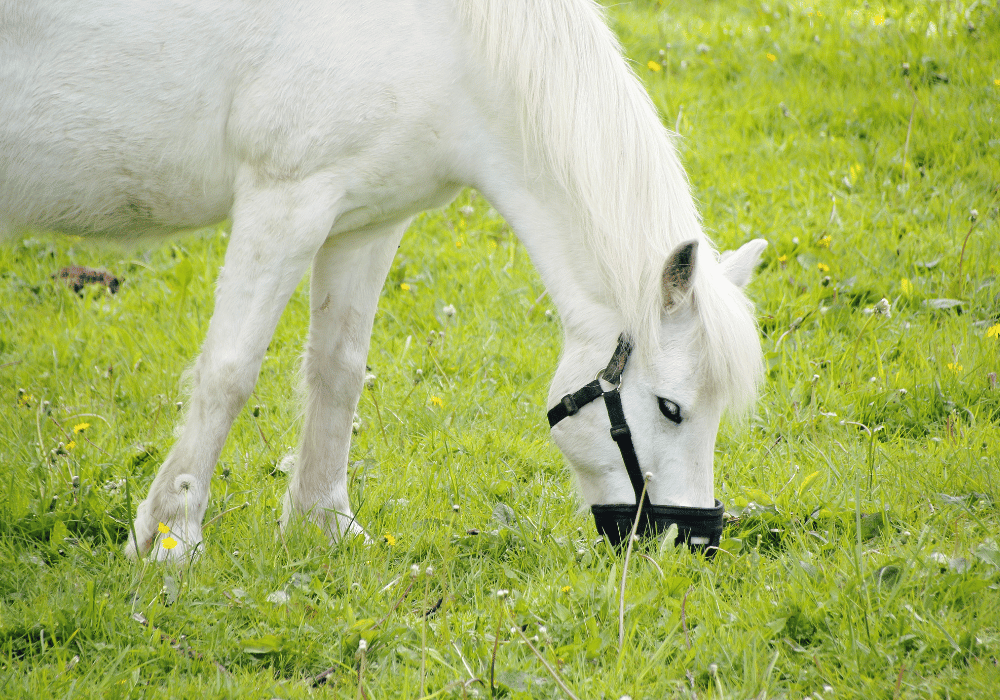Equine obesity has become a huge concern for vets and owners in recent years, with over 50% of horses and ponies in the UK reported to be overweight or obese.
We are regularly asked by concerned horse owners, “Is my horse overweight?”. This is an important question, as maintaining a healthy weight is vital for a horse’s overall well-being and performance, and there are serious health implications of equine obesity.
While our vets are always happy to assess your horse’s condition, we do recommend that owners assess their horse regularly so that they can monitor any weight changes.
To assess condition, both vets and owners should use the equine body condition score. This is an objective scoring system, and it is very easy to use.
The Health Implications of Equine Obesity
Overweight and obese horses are at a much higher risk of developing a number of health issues. These include Equine Metabolic Syndrome (EMS), laminitis, arthritis, heart and lung problems, and overheating. Read our article on the health issues associated with equine obesity to find out more.
Is My Horse Overweight? The Equine Body Condition Score
The Equine Body Condition Score is an assessment tool used to evaluate the amount of body fat a horse is carrying. It provides vets and owners with a standardised approach, allowing us to assess a horse’s condition objectively while giving us a baseline to notice changes in condition further down the line.
This system allows us to recognise whether a horse is overweight by scaling a horse’s condition from 1 to 5. Horses that fall into the healthy weight category will have a BCS of 2.5 to 3, although this does depend on the horse and their workload.
Assessing Your Horse’s Condition
The scoring system takes into account three key areas of the horse: the neck, body and hindquarters.
To start, run your hands along the crest of your horse’s neck, checking whether you can move it from side to side. Move down to the shoulders and assess whether the shoulder blade is clearly defined.
Next, run your hands over your horse’s ribcage, up to the withers then along the spine.
Finally, assess your horse’s rump, both from the side and behind. The point of the hips and the croup should be visible.
Scoring your Horse
0 - Emaciated
Your horse will have a marked ewe neck, with skin tight over his ribs. The spine will be visible, the pelvis angular and the hindquarters sunken. There will be a deep cavity under the tail and either side of the croup.
1 - Underweight
Your horse will have a ewe neck, visible ribs and sunken skin on either side of the spine. The rump will also be sunken but the skin supple, not taught. Pelvis and croup will be defined.
2 - Moderate
A narrow neck, firm shoulder blades and ribs are just visible. The spine will be well covered and processes felt but not seen. The rump will be flat but not shrunken, and the croup well defined with some fat.
3 - Good
A firm neck with no crest and defined shoulder blades. Ribs and spinous processes will be covered but easily felt, and the pelvis will be rounded.
4 - Overweight
A slight crest, well-covered ribs and a gutter along the spine with fat stored on either side. When assessed from behind, the bottom is apple-shaped, with the pelvis barely felt.
5 - Obese
Wide and firm crest with creases of fat. Shoulder blades, pelvis and ribs are buried and hard to feel. Deep gutter along the spine and a flat back, plus an apple-shaped bottom with distended skin.
How Often Should I Check My Horse’s Body Condition Score?
Assess your horse’s condition on a fortnightly basis so you can track any changes and make adjustments. Remember not to make any dietary or management changes too quickly. They should be integrated into your horse’s routine over a few weeks. If your horse needs to lose or gain weight, your vet will be able to advise you on an appropriate feed, exercise and management programme to ensure that your horse’s weight is managed safely and effectively.
Remember: If your horse loses weight suddenly, it is important to contact your equine vet immediately. Sudden loss of condition can indicate a serious health problem.
Avonvale Equine Vet Practice
We are an independent, equine-only vet practice based in Ratley, near Banbury. Our equine vets are highly qualified and experienced, and they are happy to help clients assess and manage their horse’s weight and body condition. Register your horse with us today.








